【精品】高二英语外研版选修六教学案:Module 6 Section 2 含答案
高中英语外研版选修6【教学课件】Module 2

外语教学与研究出版社 | 选修六
Read the passage summarize the main idea of the passage.
The passage is about Will and a cat. The cat is a strange creature, who acts as Will’s guide. She goes to another world through the patch in the air. And Will follows her without hesitation.
外语教学与研究出版社 | 选修六
they must journey to a
dank and gray-lit world
where no living soul has ever gone. The Amber
Spyglass brings Philip
Pullman's His Dark
Materials to an
In The Amber Spyglass, Lyra and Will are in unspeakable danger. With the help from Iorek Byrnison, the armored (装甲的) bear and two tiny Gallivespian spies,
In The Golden Compass, young Lyra Belacqua journeys to the far North to save her best friend and other kidnapped 诱拐 children from
terrible experiments by evil scientists.
高中英语外研版选修6【教学设计】Module 2

Module 2 Fantasy Literature本模块的主题是幻想小说,要求学生能够掌握相关词汇,并叙述故事梗概,提高他们对中外幻想文学和电影的鉴赏能力。
【知识目标】 Key vocabulary: vanish, blink, shape, doubt, bend, hesitate, shine, dream, awake, revenge,marry, punish, possess, behave strangely, stand still, know without any doubt that …, know … as strongly as …, climb through the hole in the walls, stand under a line of tall trees, have the scent of flowers, look around carefully, shine down over …Key structures: 1. She came out of a garden to where Will was standing .2. Still watching ,Will saw the cat behave strangely.3. Then she leapt back ,with her tail held up .4. When it had gone past he crossed the road, keeping his eyes on the place where the cat had vanished.It looked as if someone had cut a patch out of the air, about two meters from the edge of the road.【能力目标】1. To learn to write a fantasy story in English2. To learn to put written passage into a dialogue【情感目标】【教学重点】To learn about fantasy literature【教学难点】To learn to read with strategiesTape recorder, MultimediaStep 1. Introduction & Reading1. Introduce Philip Pullman and his work to students.2. Read the short introduction and fill in the blanks..3. DiscussionHave you read His Dark Materials? If not, would you like to read it? Say why or why not. Have you read a Harry Potter novel or seen one of the films? If you have, did you enjoy it? Say why or why not.Step 2. Reading and vocabulary1. Read the passage and number the sentences in the correct order.2. Read the passage summarize the main idea of the passage.3. True or False4. Read the passage again and choose the best answers.5. Find the answers in the text.Step 3. Language points1. Useful phrases2. words philosophical, vanish, behave etc.Step 4. Listening and reading1. Before listening, look at some pictures and guess what the story is about.2. Put the sentences in the correct order.3. Listen to the tape, and check your answers.4. Fill in the blanks with right words from Activity 3.5. Answer the questions about the story.Step 5. Vocabulary and reading1. Introduce J.K.Rowling and Harry Potter film series2. Read the passage and answer these questions.。
高二英语外研版选修六教学案:Module 6 Section 2 含答案
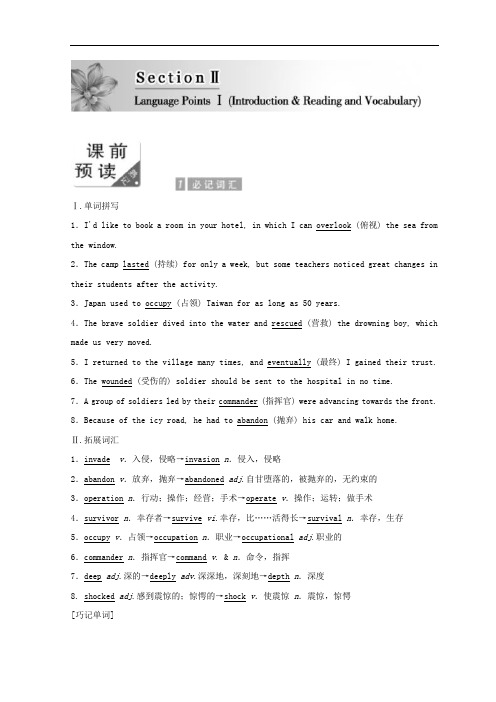
Ⅰ.单词拼写1.I'd like to book a room in your hotel, in which I can overlook (俯视) the sea from the window.2.The camp lasted (持续) for only a week, but some teachers noticed great changes in their students after the activity.3.Japan used to occupy (占领) Taiwan for as long as 50 years.4.The brave soldier dived into the water and rescued (营救) the drowning boy, which made us very moved.5.I returned to the village many times, and eventually (最终) I gained their trust. 6.The wounded (受伤的) soldier should be sent to the hospital in no time.7.A group of soldiers led by their commander (指挥官) were advancing towards the front. 8.Because of the icy road, he had to abandon (抛弃) his car and walk home.Ⅱ.拓展词汇1.invade v.入侵,侵略→invasion n.侵入,侵略2.abandon v.放弃,抛弃→abandoned adj.自甘堕落的,被抛弃的,无约束的3.operation n.行动;操作;经营;手术→operate v.操作;运转;做手术4.survivor n.幸存者→survive vi.幸存,比……活得长→survival n.幸存,生存5.occupy v.占领→occupation n.职业→occupational adj.职业的6.commander n.指挥官→command v. & n.命令,指挥7.deep adj.深的→deeply adv.深深地,深刻地→depth n.深度8. shocked adj.感到震惊的;惊愕的→shock v.使震惊n.震惊,惊愕[巧记单词]词根词形变化构词点拨command commander 动词加er构成副词operate operation 动词去e加(t)ion构成名词Ⅲ.补全短语1. at the same time 同时2.take place 发生3. at one point 一度,在某一时刻4.declare war on 对……宣战5.take part in 参加6.get off 下车/船/飞机7.make a breakthrough 取得重大突破(进展)8.pick up 停下来让某人搭车(船等);救起9.as a result 结果,因此10.be situated on 位于,坐落在1.[教材原句]The operation was extremely dangerous and many soldiers were killed before they even got off the boats.这次登陆行动异常危险,很多士兵还没来得及下船就牺牲了。
高中英语外研版选修6学案:Module 1-Section Ⅱ 含解析(精修版)
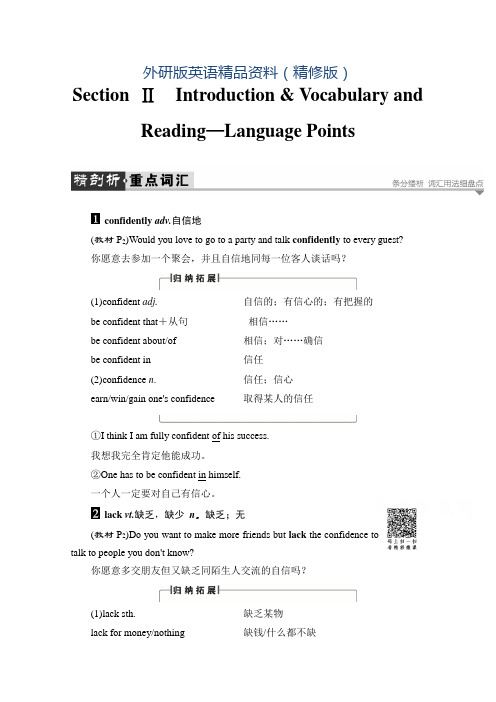
外研版英语精品资料(精修版)Section ⅡIntroduction & Vocabulary and Reading—Language Pointsconfidently adv.自信地(教材P2)Would you love to go to a party and talk confidently to every guest?你愿意去参加一个聚会,并且自信地同每一位客人谈话吗?(1)confident adj.自信的;有信心的;有把握的be confident that+从句相信……be confident about/of 相信;对……确信be confident in 信任(2)confidence n. 信任;信心earn/win/gain one's confidence 取得某人的信任①I think I am fully confident of his success.我想我完全肯定他能成功。
②One has to be confident in himself.一个人一定要对自己有信心。
lack vt.缺乏,缺少n.缺乏;无(教材P2)Do you want to make more friends but lack the confidence totalk to people you don't know?你愿意多交朋友但又缺乏同陌生人交流的自信吗?(1)lack sth. 缺乏某物lack for money/nothing 缺钱/什么都不缺(2)lack n. 缺少,缺乏the/a lack of... ……不足for lack of 因缺乏……(3)lacking adj.缺少的,缺乏的be lacking in 缺乏;没有①Lack of money is the root of all evil.缺乏金钱是万恶之源。
②He is lacking in responsibility.他缺乏责任心。
高二英语外研版选修六 Module 6 整个单元教案
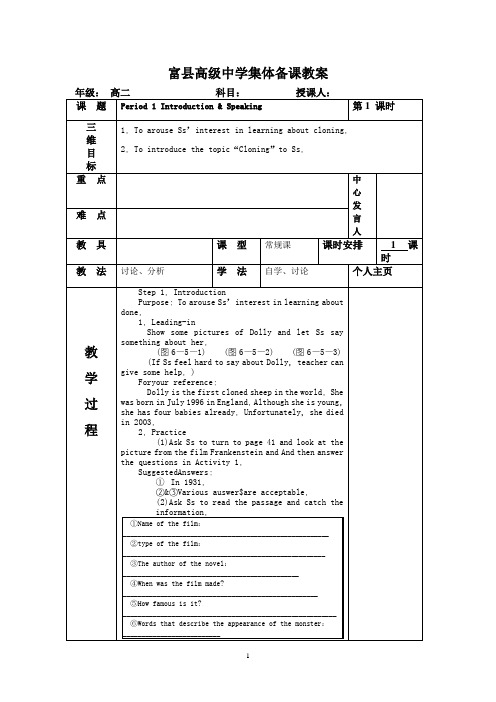
富县高级中学集体备课教案
附注:课型填“常规课”或“复习课”或“习题课”或“多媒体课”。
富县高级中学集体备课教案
附注:课型填“常规课”或“复习课”或“习题课”或“多媒体课”。
富县高级中学集体备课教案
附注:课型填“常规课”或“复习课”或“习题课”或“多媒体课”。
富县高级中学集体备课教案
附注:课型填“常规课”或“复习课”或“习题课”或“多媒体课”。
富县高级中学集体备课教案
附注:课型填“常规课”或“复习课”或“习题课”或“多媒体课”。
富县高级中学集体备课教案
附注:课型填“常规课”或“复习课”或“习题课”或“多媒体课”。
21。
高中英语外研版教材选修6 第六模块导学案 Book6 Module
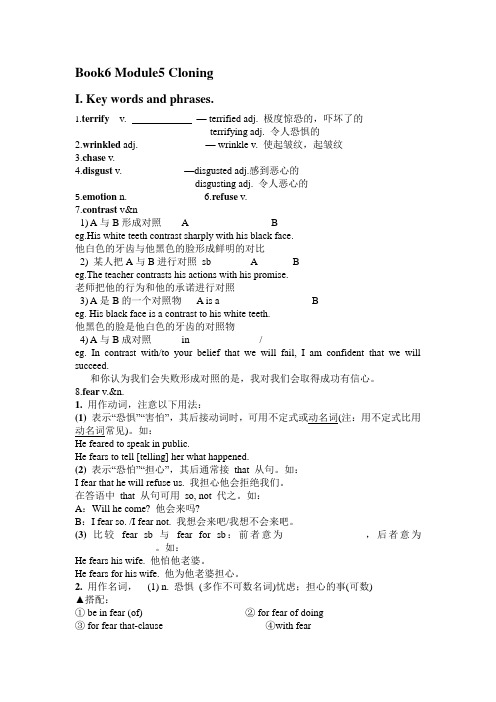
Book6 Module5 CloningI. Key words and phrases.1.terrify v. — terrified adj. 极度惊恐的,吓坏了的terrifying adj. 令人恐惧的2.wrinkled adj. _____________— wrinkle v. 使起皱纹,起皱纹3.chase v. _____________4.disgust v. ____________—disgusted adj.感到恶心的disgusting adj. 令人恶心的5.emotion n. __________6.refuse v. _________7.contrast v&n __________1) A与B形成对照A_________ _____ Beg.His white teeth contrast sharply with his black face.他白色的牙齿与他黑色的脸形成鲜明的对比2) 某人把A与B进行对照sb _______ A_______Beg.The teacher contrasts his actions with his promise.老师把他的行为和他的承诺进行对照3) A是B的一个对照物 A is a ________ _________ Beg. His black face is a contrast to his white teeth.他黑色的脸是他白色的牙齿的对照物4) A与B成对照in ________ _____/______eg. In contrast with/to your belief that we will fail, I am confident that we will succeed.和你认为我们会失败形成对照的是,我对我们会取得成功有信心。
8.fear v.&n.1.用作动词,注意以下用法:(1) 表示“恐惧”“害怕”,其后接动词时,可用不定式或动名词(注:用不定式比用动名词常见)。
外研版高中英语选修6全册教案
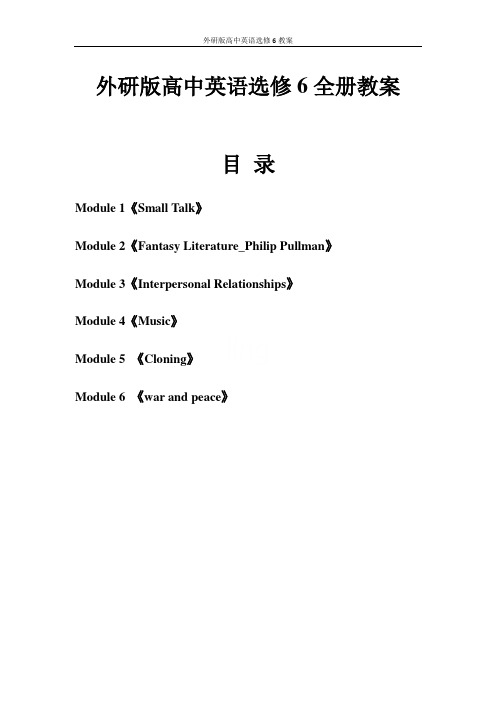
外研版高中英语选修6全册教案目录Module 1《Small Talk》Module 2《Fantasy Literature_Philip Pullman》Module 3《Interpersonal Relationships》Module 4《Music》Module 5 《Cloning》Module 6 《war and peace》Module 1 Small TalkTeaching aims:1. To introduce different social skills about talking in different culture and improve the students’ social skills.2. To know how to talk about obligation or lack of obligation.3. To master AAA talking model and to develop the friendly environment whenhaving talk with others.Important and difficult points:1. Get students to understand how to have a chat with others in English culture.2. Make students know the importance of small talk between persons.3. Help students to improve the cultural understanding skills in different countries.Teaching procedures:Step 1. In this part, the teacher can talk with students in small talk, and the teacher can choose different topic with different students.For example:T: What do you think of yesterday’s football match between your class and Class 3?S1: It’s great.S2: We won.T: Do you know why you won?S3: We are strong.T: Good. When we were discussing the football match just now, we were discussing serious things or having light conversation?Ss: Light conversation.T: Oh, yes. Just small talk.Step 2. After the teacher tell the students small talk, the students begin to read the dictionary definitions of small talk then ask the students to discuss the four questions inActivity1.Step 3. Divide the students into groups of two ones to discuss the five questions in Activity2. Then the teacher can choose some groups of students to show their smalltalk to all the students. The Ss can have different opinions, but they must give the reason for their opinions.Step 4. Make a talk between the Ss and the teacher, then introduce the topic about must, have to, don’t have to and mustn’t.For example:T: You are now in Senior Two, and I think you are all good students, although some of you sometimes behave not very properly. So I’m going to ask you some questions. Do you think students have to be on time at school?Ss: …T: Oh, yes. You are right. You have to. Then say something that you must do.S1: …S2: …T: And anything you mustn’t do?S1: …S2:…Ask the Ss to talk about the following topics:What is obligation?What is lack of obligation?According to the talking method, the teacher can introduce the definitions of obligation and lack of obligation.Step 5. Ask the students to finish Activity1 and then let the Ss to talk about the answers they have made.Ask the Ss to make similar sentences impressing obligation and lack of obligation using the words they just practiced.Step 6. Make a competition among the Ss to make sentences using must, have to, don’t have to, mustn’t, needn’t do and don’t need do. And the team which make sentences will win the competition.Step 1. Ask Ss to discuss the sentences in Activity 1 and then check the answers of the Ss’. Then learn the words in this part with the Ss.Step 2. Ask the Ss to read the text quickly and then finish Activity2. Then ask all the Ss to discuss the questions of Activity 4. Then ask the Ss to tell us the usage of the words in Activity1 and Activity 4 and find the sentences in the text: impress, damage, encourage, prepare, avoid, lack, recognize, smile.Step 3. Ask the students to read the text again, then answer the questions in Activity3 and encourage the Ss to have different answers. If the time isn’t enough, we can solve the problem in the following ways.(1)Discuss it after class.(2)Discuss the following questions as the important points.I.What do people think about those who talk too much?II.Why is it a good idea to nod and smile when the other person is talking?III.What does the quotation from Benjamin Disraeli tell you about people? Then ask the Ss to prepare for Activity5 and then ask the Ss to tell the meanings of the phrases.Step 4. Important word or phrases1. Which definitions make small talk sound like a positive thing?Sound is a link verb,its meaning in Chinese:听起来。
外研版高二英语选修6_M6_Reading_Practice_and_Cultural_C精品导学案
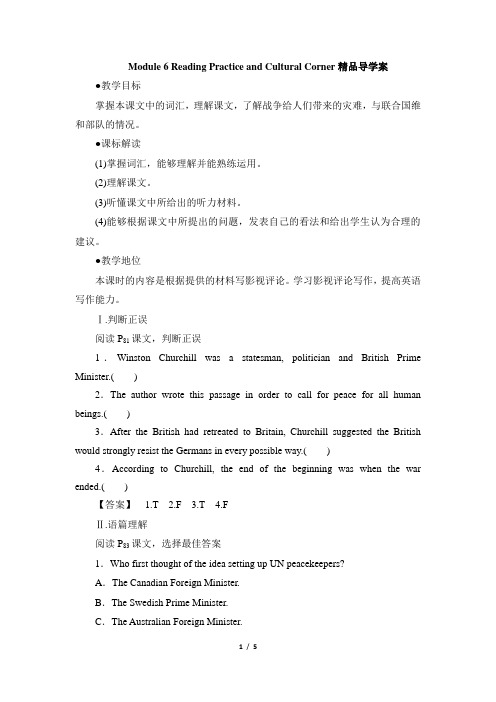
Module 6 Reading Practice and Cultural Corner精品导学案●教学目标掌握本课文中的词汇,理解课文,了解战争给人们带来的灾难,与联合国维和部队的情况。
●课标解读(1)掌握词汇,能够理解并能熟练运用。
(2)理解课文。
(3)听懂课文中所给出的听力材料。
(4)能够根据课文中所提出的问题,发表自己的看法和给出学生认为合理的建议。
●教学地位本课时的内容是根据提供的材料写影视评论。
学习影视评论写作,提高英语写作能力。
Ⅰ.判断正误阅读P81课文,判断正误1.Winston Churchill was a statesman, politician and British Prime Minister.()2.The author wrote this passage in order to call for peace for all human beings.()3.After the British had retreated to Britain, Churchill suggested the British would strongly resist the Germans in every possible way.()4.According to Churchill, the end of the beginning was when the war ended.()【答案】 1.T 2.F 3.T 4.FⅡ.语篇理解阅读P83课文,选择最佳答案1.Who first thought of the idea setting up UN peacekeepers?A.The Canadian Foreign Minister.B.The Swedish Prime Minister.C.The Australian Foreign Minister.2.Why were the armed UN peacekeepers sent to the Middle East in 1957?A.Because they wanted to see what was happening there.B.Because they wanted to protect the Suez Canal.C.Because they wanted to settle a dispute about the Suez Canal.3.From the passage we can conclude that________.A.there were more international disputes before 2000B.there were less international disputes during the 1990sC.there were more international disputes after 20004.Which of the following is NOT right?A.The UN peacekeepers wear sky-blue helmets.B.The UN peacekeepers are soldiers sent from diffident countries?C.All UN peacekeeping operations are not successful.【答案】 1.A 2.C 3.C 4.C考点精讲1.encourage n.鼓舞,鼓励But Churchill encouraged people that this was only a temporary defeat in a speech which included the words, “We shall fight on the beaches, we shall fight on the landing grounds, we shall fight in the fields and in the streets, we shall fight in the hi lls; we shall never surrender.” (P81)但是丘吉尔告诉人们这只是临时的失败,他在演讲中说:“我们会在海岸上战斗,我们会在陆地上战斗,我们会在田野里和街道上战斗,我们会在山间战斗;我们永远不投降。
- 1、下载文档前请自行甄别文档内容的完整性,平台不提供额外的编辑、内容补充、找答案等附加服务。
- 2、"仅部分预览"的文档,不可在线预览部分如存在完整性等问题,可反馈申请退款(可完整预览的文档不适用该条件!)。
- 3、如文档侵犯您的权益,请联系客服反馈,我们会尽快为您处理(人工客服工作时间:9:00-18:30)。
Ⅰ.单词拼写1.I'd like to book a room in your hotel, in which I can overlook (俯视) the sea from the window.2.The camp lasted (持续) for only a week, but some teachers noticed great changes in their students after the activity.3.Japan used to occupy (占领) Taiwan for as long as 50 years.4.The brave soldier dived into the water and rescued (营救) the drowning boy, which made us very moved.5.I returned to the village many times, and eventually (最终) I gained their trust. 6.The wounded (受伤的) soldier should be sent to the hospital in no time.7.A group of soldiers led by their commander (指挥官) were advancing towards the front. 8.Because of the icy road, he had to abandon (抛弃) his car and walk home.Ⅱ.拓展词汇1.invade v.入侵,侵略→invasion n.侵入,侵略2.abandon v.放弃,抛弃→abandoned adj.自甘堕落的,被抛弃的,无约束的3.operation n.行动;操作;经营;手术→operate v.操作;运转;做手术4.survivor n.幸存者→survive vi.幸存,比……活得长→survival n.幸存,生存5.occupy v.占领→occupation n.职业→occupational adj.职业的6.commander n.指挥官→command v. & n.命令,指挥7.deep adj.深的→deeply adv.深深地,深刻地→depth n.深度8. shocked adj.感到震惊的;惊愕的→shock v.使震惊n.震惊,惊愕[巧记单词]Ⅲ.补全短语1. at the same time 同时2.take place 发生3. at one point 一度,在某一时刻4.declare war on 对……宣战5.take part in 参加6.get off 下车/船/飞机7.make a breakthrough 取得重大突破(进展)8.pick up 停下来让某人搭车(船等);救起9.as a result 结果,因此10.be situated on 位于,坐落在1.[教材原句]The operation was extremely dangerous and many soldiers were killed before they even got off the boats.这次登陆行动异常危险,很多士兵还没来得及下船就牺牲了。
[句型点拨]before引导的时间状语从句。
[佳句赏析]我还没来得及跟他解释任何事情,他就生气地离开了。
He had left angrily before I could explain anything to him.2.[教材原句]The survivors lay on the beach, exhausted and shocked.死里逃生的战士们躺在沙滩上,疲惫不堪,心有余悸。
[句型点拨]形容词短语作状语。
[佳句赏析]干了一天的重活,那位工人回到家,又累又饿。
After a whole day's heavy work, the old worker returned home, tired and hungry. 3.[教材原句]After an hour and fortyfive minutes, six of the survivors tried to climb up the cliff to get off the beach. Four were too exhausted to reach the top.一小时四十五分钟后,六位幸存的战士试图爬上悬崖以离开海滩。
其中四名战士由于筋疲力尽未能攀上顶端。
[句型点拨]too ... to ...“太……而不能……”。
[佳句赏析]站在校长面前,这个男孩太害怕了而说不出话来。
Standing before the headmaster, the boy was too frightened to speak.1.In September 1939, Britain declared war on Germany after Germany invaded Poland.(P72) 1939年9月,英国在德国入侵波兰后向德国宣战。
★declare war on向……宣战(1)declare for/against 宣布赞成/反对declare sb. to be 宣布某人为……declare ... open 宣布……开幕declare oneself 发表意见;表明身份(2)declaration n. 宣告,宣布,公告①The country had no choice but to declare war on their enemy.这个国家别无选择,不得不向他们的敌人宣战。
②Our government declared against this plan.我们的政府声明反对这项计划。
③He declared himself to be a secret agent.他公开了自己是一个秘密间谍的身份。
[易混辨析]选用上述词语填空④They announced that they would get married on October 1.⑤The use of certain chemicals has now been declared illegal.2.During the war, Germany occupied many countries, including France.(P72)二战中,德国侵占了包括法国在内的许多国家。
★occupy v.占领,占据(时间、空间、某人头脑等);使忙碌①The big table occupies too much room.这张大桌子占了太多空间。
(1)occupy oneself with/in ... 忙于……;专心于……occupy one's mind/thought/attention 占据某人的头脑/思维/注意力(2)occupied adj. 已占用的;无空闲的;在使用的be occupied with/in ... 忙于……;专心于……keep sb. occupied with sth./(in) doing sth.使某人忙碌于(做)某事(3)occupation n. 占领;职业②Occupy yourself with/Keep yourself occupied with something interesting and you will not feel bored.忙于一些有趣的事情,你就不会厌烦了。
③Occupied with her children, Mrs White can't go shopping with us.因为忙于照顾孩子,怀特夫人不能和我们一起去购物。
④She occupied her mind with pleasant thoughts of the vacation.她沉浸在对假期的美好想象之中。
3.The operation was extremely dangerous and many soldiers were killed before they even got off the boats.(P72)这次登陆行动异常危险,很多士兵还没来得及下船就牺牲了。
★before引导的时间状语从句,在此句中before意为“还没来得及……就……”。
①He rang off before I could explain.我还没来得及解释,他就挂电话了。
it was+时间段+before ... 多长时间后就/才……it will be+时间段+before ... 多长时间后就/才……it was not long before ... 不久就……it will not be long before ... 不久就会……②It was three days before he came back.过了三天他才回来。
③It will not be long before we get used to the new school life.不久我们就会习惯新的学校生活。
4.The situation at Omaha Beach was so bad that the US army commanders thought about abandoning the invasion.(P72)奥马哈海滩的形势非常严峻,以至于美军司令官都考虑放弃进攻了。
★abandon v.放弃,抛弃,中止,陷入,沉湎于 n.放任,放纵①They had to abandon the match because of rain.因为下雨,他们不得不中止了比赛。
②We should not abandon a friend who is in danger.我们不应该抛弃处于危险之中的朋友。
(1) abandon (doing) sth. 放弃(做)某事abandon oneself to ... 沉溺于……,放纵……abandon one's post/hope/plan/idea放弃职位/希望/计划/主意with abandon 放纵地;尽情地(2)abandoned adj. 被抛弃了的;废弃的;放纵的③Mother often warns me not to abandon myself to playing(play) computer games.妈妈经常警告我不要沉迷于玩电脑游戏。
